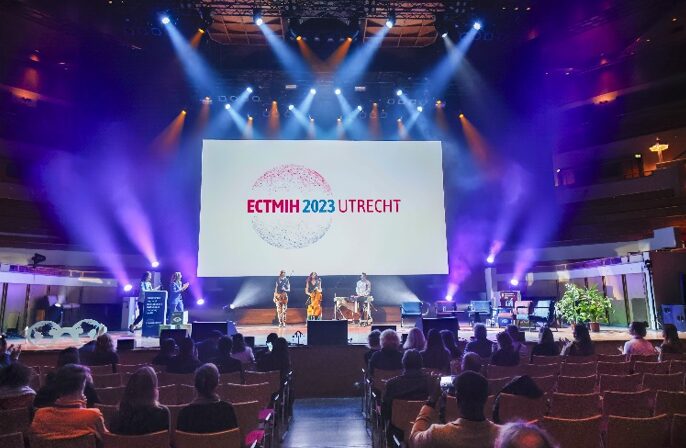
Blog: Uniting Planetary Health and Climate Justice – A Call to Global Action
by Baby Naznin, Senior Research Associate (BRAC University, James P. Grant School of Public Health, Bangladesh)
In the heart of Utrecht, Netherlands, the 13th European Congress for Tropical Medicine and International Health ( href=”https://www.ectmih2023.nl/”>ECTMIH) recently concluded, leaving a profound impact on the global discourse around planetary health. Organized by the Federation of European Societies of Tropical Medicine and International Health (FESTMIH), this gathering brought together a diverse array of stakeholders – from medical professionals to public health experts, researchers, and members of civil society, although with limited representation from policymakers. At the forefront of discussions was the critical intersection between planetary health and climate change.

The overarching theme, “shaping the future of equitable and sustainable planetary health,” spotlighted the intricate relationship between the well-being of our planet and the pressing issue of climate change. Throughout various plenary sessions, the discussions delved deep into the alarming repercussions of extreme weather events—ranging from heatwaves and floods to cyclones, wildfires, droughts, environmental pollutions, salinity, and sea level rise—on vulnerable communities. Asian and African regions, including countries such as Congo, Sudan, Pakistan, the Philippines, Nepal, and Bangladesh, bore the brunt of these events. The severe impacts and losses experienced by these nations, especially among vulnerable communities, underscored the immediate and compelling need for collective action.
A clear message unfolded during discussions on climate injustice, emphasizing that those least responsible for the environmental crisis often bear the heaviest burden. Low- and middle-income countries (LMICs) in tropical and subtropical areas face disproportionate vulnerability, with the least resources to combat the consequences. Richer nations, though major contributors to carbon emissions, suffer comparatively less from climate change.
“As we discuss climate injustice, it’s crucial to recognize that those least responsible for the environmental crisis often bear the heaviest burden,” (ECHTIM speaker)
This sentiment captures the essence of the discussions that unfolded, highlighting the harsh reality that LMICs face despite their minimal contribution to global carbon emissions. The call for action is not merely a plea but a demand for global solidarity. The Congress served as a rallying point for a collective commitment to address the climate crisis as a shared responsibility. There was a resounding emphasis on the imperative to urgently implement globally identified actions rather than merely vocalizing intentions.
The message was clear – it’s time to move beyond words and actively engage in meaningful, impactful initiatives.
The discussions also explored decolonizing planetary health, urging a move beyond cosmetic changes to address asymmetries of power, justice, and peace. The imperative to learn from the experiences of the global south resonated strongly, as the global north was urged to understand and implement lessons from more vulnerable regions. Notably, there were discussions that underscored the paramount importance of embracing community support structures and fostering active engagement. Concurrently, the delivery of high-quality services using appropriate technology within resource-constrained settings emerged as a pivotal consideration. This imperative could materialize in swift transitions toward the adoption of digital and e-health solutions, signaling a transformative approach to healthcare delivery. Furthermore, a salient aspect of the discourse accentuated the utilization of renewable energy at the community level. A compelling illustration of this concept is found in the implementation of small-scale solar electricity grids in rural or informal settlements, distinguished by community ownership. These initiatives not only embody pragmatism in bolstering healthcare accessibility but also set a formidable stage for environmentally conscious and community-driven solutions, thereby fostering a more equitable and sustainable future.
Amidst the challenges, hope also emerged in the form of the World Health Organization’s operational framework for building climate-resilient and low-carbon health systems. Mitigation options in urban areas were explored, emphasizing synergies with sustainable development goals. WHO’s active involvement in these initiatives underscored the commitment to tangible measures and international cooperation.
In conclusion, the 13th European Congress not only brought forth the harsh realities of climate injustice but also ignited a spark for change. As the speakers passionately called for immediate action, their words served as a poignant reminder that the time for global collaboration and sustainable solutions is now.
The symphony of voices in Utrecht echoes a collective resolve to bridge the gap between urban health and climate justice, signaling a new era of conscientious global citizenship.
As a participant in this conference, I believe that fostering the resilience of planetary health demands active participation from each of us within our own spheres. Even small actions can make a significant impact, and a collective commitment to modest climate actions will undoubtedly contribute to the improvement of planetary health. This collective responsibility begins with individual endeavors, and through our joint commitment, we have the potential to effect positive change for the greater good of our planet.
Photo Credit: Baby Naznin, BRAC University

